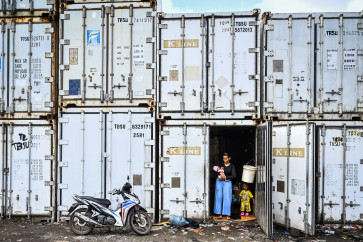Popular Reads
Top Results
Can't find what you're looking for?
View all search resultsPopular Reads
Top Results
Can't find what you're looking for?
View all search resultsLabuan Cermin, a mirror in the Berau pool
Labuan Cermin, a cove in Biduk-Biduk district, Berau regency, East Kalimantan, is famous for its unique two-flavor lake water, fresh on the surface and salty at the bottom, with different types of fish coexisting alongside one another
Change text size
Gift Premium Articles
to Anyone
L
abuan Cermin, a cove in Biduk-Biduk district, Berau regency, East Kalimantan, is famous for its unique two-flavor lake water, fresh on the surface and salty at the bottom, with different types of fish coexisting alongside one another. It is also believed to have been a bathing place for Berau kings.
For a better view of oil palm estates on hundreds of hectares of former forestland, members of an eco-divers’ club, including journalists, chose to travel by land along the Berau–East Kutai route. The gorgeous views of Labuan Cermin or the Mirror Lake, likened by some to the beach Thai Phi Phi Leh Island where Leonardo DiCaprio starred in the film The Beach, is worthy of the four-hour trip.
Bordering the Sulawesi Sea, Labuan Cermin is surrounded by mangroves and hills as sources of fresh water, which flows into the seawater trapped in the lake. Therefore, Labuan Cermin has fresh water and brine, the former filling the top part and the latter remaining at the bottom of the 13-meter-deep lake.
Labuan Cermin is about 250 kilometers south of Tanjung Redep, the seat of administration of Berau regency, East Kalimantan. From Jakarta, tourists can travel by air at a cost of Rp 500,000–Rp 900,000 (US$55–$98) to Sepinggan Airport, Balikpapan, and further to Kalimarau Airport, Tanjung Redep, Berau, at Rp 900,000–Rp 1 million per person.
To reach Labuan Cermin, tourists can use a taxi service, which in Berau is provided by multi-purpose vehicles (MPV) offering the fare of Rp 400,000–Rp 500,000 per day excluding fuel. “The road from Tanjung Redep to Biduk-Biduk has been repaired for a year now. Previously, the access to the district opened in 1996 was severely damaged,” said Biduk-Biduk district head Saharuddin.
According to Saharuddin, most of the people in Biduk-Biduk are fishermen. The district has a population of 6,018 living in four villages: Tanjung Perepat, Pantai Harapan, Giring-Giring and Biduk-Biduk. Lake Labuan Cermin is located in Labuan Cermin hamlet, Biduk-Biduk village.
In the hamlet, the group members stay in the Fishermen Information Center of the Labuan Cermin Community Welfare Institute (Lekmalamin), a community for the conservation of Labuan Cermin set up with the facilitation of The Nature Conservancy (TNC) and the World Wildlife Fund (WWF).
Apart from the activity of fishermen in Labuan Kelambu, the hamlet is also known as the boat handicraft area of local residents. However, the limited timber supply has reduced the number of craftsmen while many members of the younger generation choose to work in the industrial sector in Samarinda or Balikpapan.
Lekmalamin chairman Ramli said tourists could also stay at local residents’ homes or inns, ranging from Rp 50,000 to Rp 300,000 per night. The distance between the inns and fishermen operational sites in Labuan Kelambu is around 8 kilometers.
In the 1990s, Labuan Cermin was fishermen’s favorite fishing ground, offering abundant sea fish of various species like red snappers and fresh water fish like kampuleng (a kind of milkfish). The fish have long adapted to the lake’s water conditions. After 1998, local fishermen stopped fishing in Labuan Cermin and decided to conserve the lake’s ecosystem.
“We began to realize the importance of conservation, let alone the presence of life-sustaining water resources in our village. Besides the ban on fishing in Labuan Cermin, no explosives have since been used to catch sea fish as they damage coral reefs,” added Ramli.
— Photos by Indra Harsaputra










